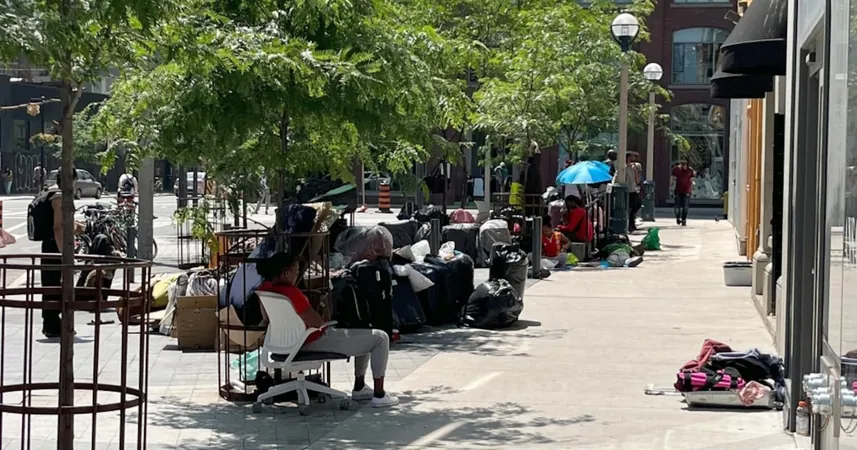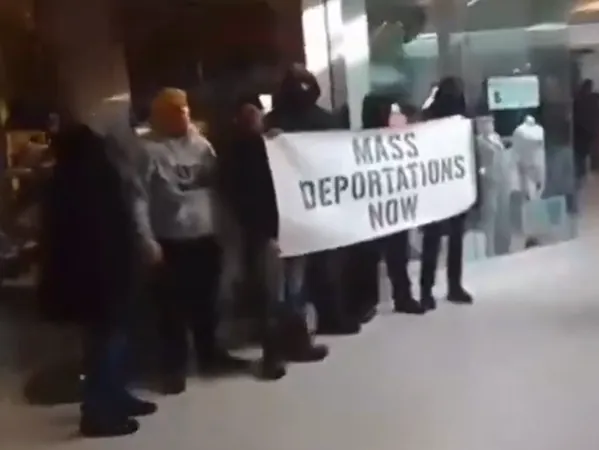
Toronto City Manager Dismisses Ombudsman's Findings on Refugee Treatment in Shelters
2024-12-12
Author: Noah
Overview of the Situation
The ongoing crisis surrounding refugees in Toronto has reached new heights as City Manager Paul Johnson publicly rejected a recent report by the Toronto Ombudsman, which criticized the city’s handling of refugee claimants within the emergency shelter system. The report, spanning 129 pages, highlighted significant shortcomings in the city’s previous decision to divert refugees from shelters to federal programs—a move that many argue was not only unfair but detrimental to the well-being of vulnerable individuals seeking safety.
Ombudsman’s Concerns
Ombudsman Kwame Addo underscored the urgency of the situation in a press release, specifying that the city failed to uphold principles of transparency and equity. He expressed concern over the emotional turmoil experienced by refugees, many of whom felt marginalized and unwelcome in Toronto, a city they looked upon as a sanctuary.
City Manager's Response
City Manager Johnson, however, expressed disappointment with the report's "accusatory" tone, asserting that it overlooked the complex realities the city faced. He indicated that recommendations put forth by the Ombudsman would not be acted upon beyond the measures already in progress, firmly stating, "I do not agree with the findings."
Background of the Policy
The controversial policy to divert refugees from the shelter system was initially introduced amid a substantial influx of newcomers following the easing of COVID-19 border restrictions. By mid-2023, the city faced extraordinary challenges, with shelters overflowing and many refugees left with no choice but to sleep on the streets while awaiting assistance.
Funding Issues
Compounding the crisis, the federal government ended funding for housing support programs earlier in the year, further straining the shelter system. As a result, the city decided to implement its policy on June 1, suggesting that individuals in need be sent to federal assistance programs, leaving thousands without immediate shelter.
Current Refugee Situation
By spring 2023, the situation had become increasingly dire with more than 3,000 refugees populating one-third of Toronto's emergency shelters. In a commendable grassroots response, various Black-led organizations began rallying resources to provide immediate aid for these refugees, often putting their own operations in jeopardy.
Findings of the Investigation
The Ombudsman’s investigation, which began in September 2023, revealed alarming discrepancies, including a breach of the Toronto Housing Charter and other established policies aimed at ensuring equitable access to services. Importantly, the report noted that refugees were often directed to services that were unavailable, while others were turned away from shelters even when space was accessible.
Systemic Issues Identified
Specifically, the report pointed to a systematic failure in processing and communicating eligibility for shelter assistance, leading to “confused implementation” of policies. In particular, the Ombudsman found evidence of systemic discrimination against refugee claimants based on race and citizenship, with many affected individuals originating from African countries.
Recommendations by the Ombudsman
In light of these findings, Ombudsman Addo has put forth 14 recommendations aimed at improving the transparency and fairness of the city’s processes related to housing for vulnerable populations. These recommendations call for improved training for city staff, better engagement with refugee advocacy groups, and mechanisms for accountability to align city actions with existing human rights commitments.
Future Considerations
As the Toronto City Council prepares to discuss the Ombudsman's report next week, the public awaits clarity on how the city will address these pressing issues. With the rising humanitarian crisis and growing concerns over both human rights and systemic racism, the response from city officials and government at all levels will be under intense scrutiny.
Conclusion: A Critical Juncture
Toronto’s officials now stand at a crossroads: whether to adopt a more equitable, humane approach in their housing policies or continue down a path of inconsistency and exclusion that only exacerbates barriers for those who seek refuge in one of Canada’s largest cities.









 Brasil (PT)
Brasil (PT)
 Canada (EN)
Canada (EN)
 Chile (ES)
Chile (ES)
 España (ES)
España (ES)
 France (FR)
France (FR)
 Hong Kong (EN)
Hong Kong (EN)
 Italia (IT)
Italia (IT)
 日本 (JA)
日本 (JA)
 Magyarország (HU)
Magyarország (HU)
 Norge (NO)
Norge (NO)
 Polska (PL)
Polska (PL)
 Schweiz (DE)
Schweiz (DE)
 Singapore (EN)
Singapore (EN)
 Sverige (SV)
Sverige (SV)
 Suomi (FI)
Suomi (FI)
 Türkiye (TR)
Türkiye (TR)